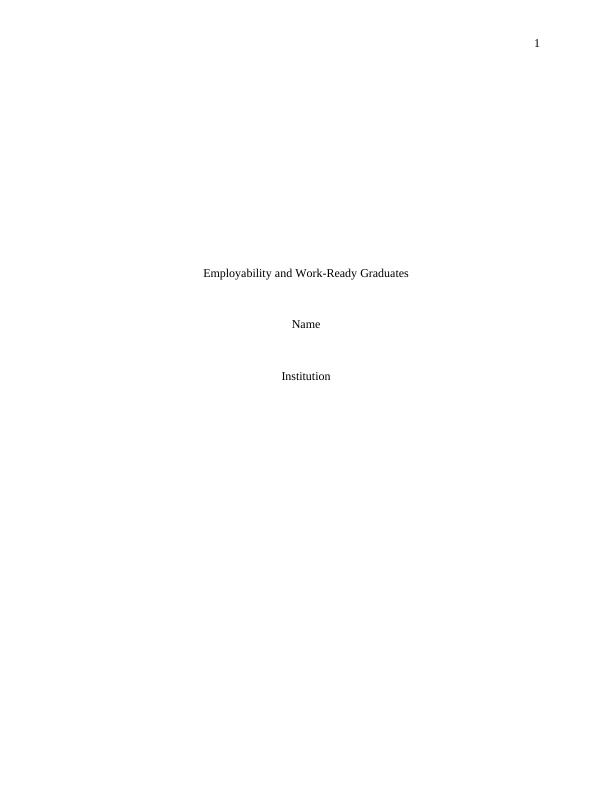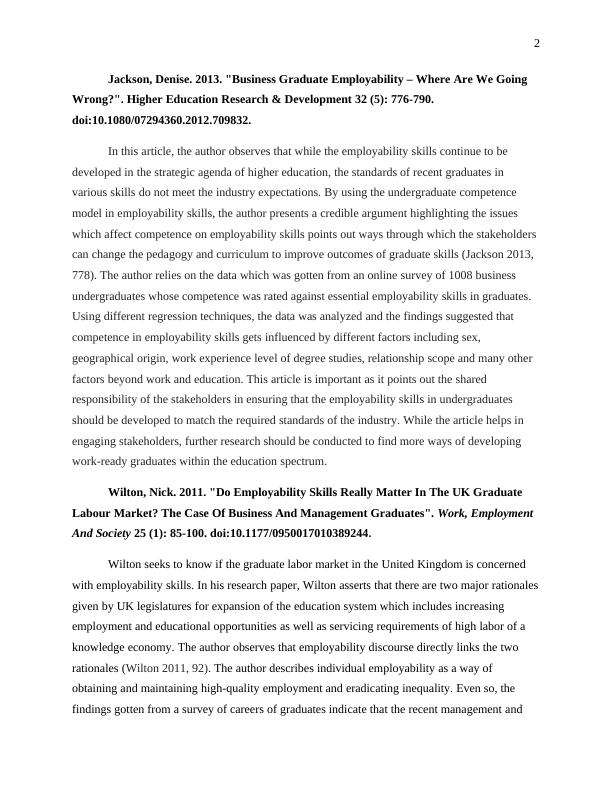Employability and Work-Ready Graduates
Added on 2022-10-04
6 Pages1574 Words305 Views
1
Employability and Work-Ready Graduates
Name
Institution
Employability and Work-Ready Graduates
Name
Institution

2
Jackson, Denise. 2013. "Business Graduate Employability – Where Are We Going
Wrong?". Higher Education Research & Development 32 (5): 776-790.
doi:10.1080/07294360.2012.709832.
In this article, the author observes that while the employability skills continue to be
developed in the strategic agenda of higher education, the standards of recent graduates in
various skills do not meet the industry expectations. By using the undergraduate competence
model in employability skills, the author presents a credible argument highlighting the issues
which affect competence on employability skills points out ways through which the stakeholders
can change the pedagogy and curriculum to improve outcomes of graduate skills (Jackson 2013,
778). The author relies on the data which was gotten from an online survey of 1008 business
undergraduates whose competence was rated against essential employability skills in graduates.
Using different regression techniques, the data was analyzed and the findings suggested that
competence in employability skills gets influenced by different factors including sex,
geographical origin, work experience level of degree studies, relationship scope and many other
factors beyond work and education. This article is important as it points out the shared
responsibility of the stakeholders in ensuring that the employability skills in undergraduates
should be developed to match the required standards of the industry. While the article helps in
engaging stakeholders, further research should be conducted to find more ways of developing
work-ready graduates within the education spectrum.
Wilton, Nick. 2011. "Do Employability Skills Really Matter In The UK Graduate
Labour Market? The Case Of Business And Management Graduates". Work, Employment
And Society 25 (1): 85-100. doi:10.1177/0950017010389244.
Wilton seeks to know if the graduate labor market in the United Kingdom is concerned
with employability skills. In his research paper, Wilton asserts that there are two major rationales
given by UK legislatures for expansion of the education system which includes increasing
employment and educational opportunities as well as servicing requirements of high labor of a
knowledge economy. The author observes that employability discourse directly links the two
rationales (Wilton 2011, 92). The author describes individual employability as a way of
obtaining and maintaining high-quality employment and eradicating inequality. Even so, the
findings gotten from a survey of careers of graduates indicate that the recent management and
Jackson, Denise. 2013. "Business Graduate Employability – Where Are We Going
Wrong?". Higher Education Research & Development 32 (5): 776-790.
doi:10.1080/07294360.2012.709832.
In this article, the author observes that while the employability skills continue to be
developed in the strategic agenda of higher education, the standards of recent graduates in
various skills do not meet the industry expectations. By using the undergraduate competence
model in employability skills, the author presents a credible argument highlighting the issues
which affect competence on employability skills points out ways through which the stakeholders
can change the pedagogy and curriculum to improve outcomes of graduate skills (Jackson 2013,
778). The author relies on the data which was gotten from an online survey of 1008 business
undergraduates whose competence was rated against essential employability skills in graduates.
Using different regression techniques, the data was analyzed and the findings suggested that
competence in employability skills gets influenced by different factors including sex,
geographical origin, work experience level of degree studies, relationship scope and many other
factors beyond work and education. This article is important as it points out the shared
responsibility of the stakeholders in ensuring that the employability skills in undergraduates
should be developed to match the required standards of the industry. While the article helps in
engaging stakeholders, further research should be conducted to find more ways of developing
work-ready graduates within the education spectrum.
Wilton, Nick. 2011. "Do Employability Skills Really Matter In The UK Graduate
Labour Market? The Case Of Business And Management Graduates". Work, Employment
And Society 25 (1): 85-100. doi:10.1177/0950017010389244.
Wilton seeks to know if the graduate labor market in the United Kingdom is concerned
with employability skills. In his research paper, Wilton asserts that there are two major rationales
given by UK legislatures for expansion of the education system which includes increasing
employment and educational opportunities as well as servicing requirements of high labor of a
knowledge economy. The author observes that employability discourse directly links the two
rationales (Wilton 2011, 92). The author describes individual employability as a way of
obtaining and maintaining high-quality employment and eradicating inequality. Even so, the
findings gotten from a survey of careers of graduates indicate that the recent management and

3
business graduates do not have a straightforward between employment and employability. The
findings suggest that the disadvantage of the traditional labor market continues to persist even as
graduates enhance their employability skills during their studies. In view of this paper,
employability skills are highly sought in the labor market and while this is true for most
countries, most graduates do not reveal their employability. The author strongly argues that the
agenda of developing employability skills in universities have failed to produce graduates that
can meet industry expectations. This paper agrees with the author that there is a need to further
integrate employability skills within the course teachings so that students are in touch with the
industry expectations when they graduate.
Culkin, Nigel, and Sofie Mallick. 2011. "Producing Work-Ready Graduates: The
Role Of The Entrepreneurial University". International Journal Of Market Research 53 (3):
347-368. doi:10.2501/ijmr-53-3-347-368.
In this article, Culkin and Mallick examine the role of entrepreneurial university in
delivering work-ready graduates. The authors point out the 2010 spending review that would
reduce the budget from 7.1 billion pounds to 4.2 billion pounds by 2014 (Culkin and Mallick
2011, 352). With this article, the authors aim at contributing to the debate on graduate skills.
They demonstrate the fact that producing graduates that are employment ready fails to
acknowledge the demands of the dynamic and altered environment of work. Whereas the
primary focus of the authors is the graduates, they are also aware of the market research industry
which is also dealing with challenges of external pressures of shifting from gathering of data to
intelligent providers. The article then moves to develop of new university type which is aimed at
reducing the dependency on the conventional funding sources. Finally, they present a model of a
research facility that has actively engaged students and which has helped more than seventy
researchers with a business mindset. In view of this paper, the authors present a strong argument
by using the 2010 spending review to argue that by reducing the budget for higher education, it is
not possible to produce graduates who are employment-ready because the environment of work
is altered and dynamic. Even so, it is true that the working environment is dynamic and gets
altered frequently, the employability of graduates can survive the dynamism.
business graduates do not have a straightforward between employment and employability. The
findings suggest that the disadvantage of the traditional labor market continues to persist even as
graduates enhance their employability skills during their studies. In view of this paper,
employability skills are highly sought in the labor market and while this is true for most
countries, most graduates do not reveal their employability. The author strongly argues that the
agenda of developing employability skills in universities have failed to produce graduates that
can meet industry expectations. This paper agrees with the author that there is a need to further
integrate employability skills within the course teachings so that students are in touch with the
industry expectations when they graduate.
Culkin, Nigel, and Sofie Mallick. 2011. "Producing Work-Ready Graduates: The
Role Of The Entrepreneurial University". International Journal Of Market Research 53 (3):
347-368. doi:10.2501/ijmr-53-3-347-368.
In this article, Culkin and Mallick examine the role of entrepreneurial university in
delivering work-ready graduates. The authors point out the 2010 spending review that would
reduce the budget from 7.1 billion pounds to 4.2 billion pounds by 2014 (Culkin and Mallick
2011, 352). With this article, the authors aim at contributing to the debate on graduate skills.
They demonstrate the fact that producing graduates that are employment ready fails to
acknowledge the demands of the dynamic and altered environment of work. Whereas the
primary focus of the authors is the graduates, they are also aware of the market research industry
which is also dealing with challenges of external pressures of shifting from gathering of data to
intelligent providers. The article then moves to develop of new university type which is aimed at
reducing the dependency on the conventional funding sources. Finally, they present a model of a
research facility that has actively engaged students and which has helped more than seventy
researchers with a business mindset. In view of this paper, the authors present a strong argument
by using the 2010 spending review to argue that by reducing the budget for higher education, it is
not possible to produce graduates who are employment-ready because the environment of work
is altered and dynamic. Even so, it is true that the working environment is dynamic and gets
altered frequently, the employability of graduates can survive the dynamism.

End of preview
Want to access all the pages? Upload your documents or become a member.
Related Documents
Are Business Students Work-Ready?lg...
|5
|1593
|61
Are Business Students work-ready?lg...
|7
|1738
|53
The Importance of Work-Readiness Skills for Business Graduateslg...
|7
|1543
|400
Employability Skills in Higher Education and Graduate Labour Marketlg...
|4
|1164
|184
Annotated Bibliography on Employability Skills of Graduateslg...
|7
|1699
|156
Perceived Employability Among Undergraduates and Career Self-Managementlg...
|5
|860
|424
